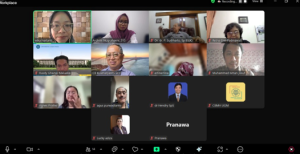CBMH UGM Finalizes Response to UNESCO’s Recommendation on Neurotechnology Ethics, Highlights the Need for International Oversight and Protection of Vulnerable Groups
 Yogyakarta, December 20, 2024 — The Center for Bioethics and Medical Humanities (CBMH UGM) successfully held a discussion to finalize its response to UNESCO’s Preliminary Report on the First Draft of The Recommendation on the Ethics of Neurotechnology. This activity aimed to provide written feedback and suggestions for the improvement of the draft recommendations on neurotechnology ethics, which will be submitted to UNESCO as a guiding document for neurotechnology ethics.
Yogyakarta, December 20, 2024 — The Center for Bioethics and Medical Humanities (CBMH UGM) successfully held a discussion to finalize its response to UNESCO’s Preliminary Report on the First Draft of The Recommendation on the Ethics of Neurotechnology. This activity aimed to provide written feedback and suggestions for the improvement of the draft recommendations on neurotechnology ethics, which will be submitted to UNESCO as a guiding document for neurotechnology ethics.
The event was attended by the UNESCO Chairs Bioethics UGM team, key stakeholders, policymakers, and expert practitioners in the application of neurotechnology in Indonesia. This collaboration supports Sustainable Development Goals (SDGs) 17, Partnership for the Goals, by fostering cooperation for sustainable development.
The feedback and recommendations provided cover two key documents: the Preliminary Report on the 1st Draft of the Recommendation on the Ethics of Neurotechnology and the First Draft of the Recommendation on the Ethics of Neurotechnology. The main points highlighted the need to expand the scope of the documents, followed by a call for more precise definitions, objectives, and the importance of respecting religious and local cultural values. This emphasis was driven by the recognition of differing values and standards between developing and developed countries.
The proposed policy also calls for the establishment of an international regulatory body responsible for overseeing the ethics of neurotechnology. Additionally, it recommends explicit protections for vulnerable groups, including individuals with critical illnesses and those in a brain-dead state. Support is also required for the use of technology in the field of neurology, including education and training for neurosurgeons.
During the development of neurotechnology, it is essential to prioritize aspects such as privacy, well-being, acceptance, and user-friendliness from the user’s perspective. In practice, neurotechnology should be designed to be easily implementable, with clear indicators for measuring success.
Furthermore, the importance of longitudinal studies was emphasized to better understand the long-term effects of implanted neurotechnology. Additional suggestions were also provided to support the refinement of UNESCO’s documents.
Reporter : Ardhini Nugrahaeni, M.KM
Editor : Alvira Rahmasari, S.H.G.
